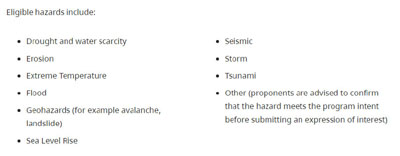Tuesday June 18, 2024 | VICTORIA, BC
by Mary P Brooke | Island Social Trends
Local governments will have more grants they can apply for. In this case for emergency-response preparation. The deadline is September 15, 2024 for the first round of funding for 2024-2025.
Eligible projects will be those that strengthen defences against natural and climate-driven hazards, such as floods, drought, extreme heat and landslides. That includes seismic and tsunami.
NEWS RELEASE about Disaster Resilience and Innovation Funding
Ministry of Emergency Management and Climate Readiness – June 18, 2024
People and communities will be better protected from natural and climate-driven emergencies with the introduction of a new provincial funding program, which will support disaster risk reduction and climate-adaptation projects in B.C.
The new Disaster Resilience and Innovation Funding (DRIF) program will support First Nation and local government projects that strengthen defences against natural and climate-driven hazards, such as floods, drought, extreme heat and landslides.
“The growing frequency of climate-related events – from extreme heat to floods and drought – is having a dire impact on people in B.C.,” said Bowinn Ma, Minister of Emergency Management and Climate Readiness. “Communities have told us they need additional funding certainty to address their climate-risk needs, so we’re introducing this program to help begin to give them reliable, long-term funding to make people and their communities safer.”
The fund will provide approximately $15 million in its first year and $25 million in its second year for eligible projects. Eligible hazards include drought and water scarcity, erosion, extreme temperature, flood, sea-level rise, earthquakes and tsunamis, and geohazards, such as avalanches and landslides. Support for wildfire-risk reduction remains available through the Ministry of Forests.
Expressions of interest (EOI) from First Nations and local governments are being accepted by the Province. EOIs received by Sept. 15, 2024, will be considered for the first round of funding beginning in the 2024-25 fiscal year.
“The new DRIF program aligns with our development of the B.C. Flood Strategy, which guides the Province’s continued work with First Nations, local government agencies, the agricultural sector, industry and conservation organizations, as we work to reduce flood risk,” said Nathan Cullen, Minister of Water, Land and Resource Stewardship. “As we developed the flood strategy, we heard loud and clear that communities across the province need long-term, stable funding programs to reduce the risks of flooding, as well as other natural and climate-driven hazards, and the DRIF is designed to help fill those gaps.”
The DRIF program will fund projects that support communities to:
- increase their understanding of risks and risk-reduction measures, including data acquisition, risk assessment, mapping, partnership building and planning;
- reduce their risk through non-structural projects, such as policy and bylaw development, community education and temporary-mitigation equipment; and
- reduce their risks through structural projects, including nature-based infrastructure.
Since 2017, the Province has provided approximately $400 million for more than 2,150 disaster-mitigation projects through the Ministry of Emergency Management and Climate Readiness funding programs. Approximately half of the funding has gone to communities since December 2022, demonstrating the Province’s commitment to ramping up defences against climate emergencies in B.C.
The DRIF program builds on existing provincial disaster preparedness and mitigation programs, including:
- The $369-million Community Emergency Preparedness Fund (CEPF) provides funding to communities for emergency preparedness projects, such as emergency support-services equipment and training, emergency operations centre equipment and training, and public notification and evacuation-route planning.
- The Community Resiliency Investment (CRI) program, including FireSmart initiatives, provides stable, ongoing funding to reduce wildfire risks.
The Province recently invested $100 million to support the continuation and expansion of the CRI program and the BC FireSmart committee over the next three years. - The $100-million Agricultural Water Infrastructure program supports new or improved water storage and supply systems for irrigation and livestock in water-scarce and drought-prone areas.
===== LINKS provided by BC Government:
Emergency-management financial supports in B.C.,








